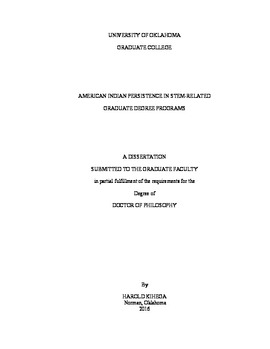| dc.contributor.advisor | Laubach, Timothy | |
| dc.contributor.author | Kihega, Harold | |
| dc.date.accessioned | 2016-05-16T14:58:27Z | |
| dc.date.available | 2016-05-16T14:58:27Z | |
| dc.date.issued | 2016-05-13 | |
| dc.identifier.uri | https://hdl.handle.net/11244/34698 | |
| dc.description.abstract | Historically, American Indians (AI) continue to struggle to meet the same levels of educational success as their United States counterparts. Moreover, AIs are the least represented group earning a college degree in the areas of science, technology, engineering, and mathematics (STEM). Previous studies have focused on AI undergraduate persistence, yet there remains a void in the area of graduate level success in STEM-related fields for AIs. This study used a phenomenological method to discover three areas of interest. First, the AI participants in this study became interested in STEM-related subjects at different times in their lives. Second, having teacher mentors at critical times in the AI participants’ school career was necessary for their success. Third, peer collaborative learning was a fundamental part of their success in STEM-related curricula at the both the undergraduate and graduate level. The findings of this study reveal the need for future research in the area of AI STEM-related education.
Keywords: STEM, Education, American Indian, persistence, collaborative learning, mentoring, graduate level. | en_US |
| dc.language | en_US | en_US |
| dc.subject | STEM, American Indian, Persistence | en_US |
| dc.title | American Indian Persistence In STEM-Related Graduate Degree Programs | en_US |
| dc.contributor.committeeMember | Marek, Edmund | |
| dc.contributor.committeeMember | Houser, Neil | |
| dc.contributor.committeeMember | Ruan, Jiening | |
| dc.contributor.committeeMember | Kerry, Magruder | |
| dc.date.manuscript | 2016-05-12 | |
| dc.thesis.degree | Ph.D. | en_US |
| ou.group | Jeannine Rainbolt College of Education::Department of Instructional Leadership and Academic Curriculum | en_US |
